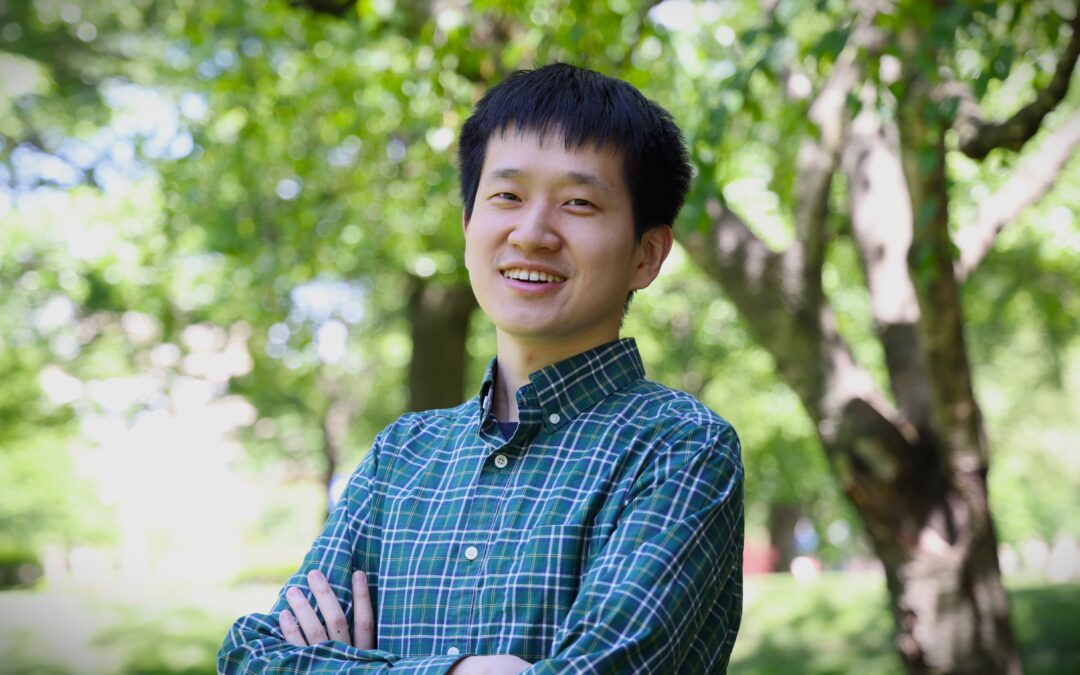By: Happiness E. Aigbogun | Karikari Lab
Yijun Chen was a PhD student in the lab of Dr. Thomas Karikari, the Director of the Biofluid Biomarker Laboratory and the Mass Spectrometry and Single Molecule Analytics programs at the University of Pittsburgh School of Medicine.
Photo by Brandon DeLorme
Dr. Yijun Chen successfully defended his PhD in July 2025 under the co-mentorship of Dr. Thomas Karikari and Dr. Nathan Yates, marking the culmination of a research journey that fused engineering precision with clinical relevance in Alzheimer’s disease biomarker discovery.
Before joining the Karikari Lab at the University of Pittsburgh, Dr. Chen trained as a biomedical engineer, earning a Master’s degree in Biomedical Engineering from Stevens Institute of Technology in New Jersey. He complemented this academic foundation with three years of industry experience as a Medical Technologist at a contract research organization (CRO), where he developed LC-MS/MS assays for clinical applications under GLP/GCP compliance. This blend of technical depth and regulatory experience would later prove invaluable in his doctoral work.
In the Karikari Lab, Dr. Chen focused on the development and application of advanced mass spectrometry methods to improve blood-based biomarker measurement and interpretation for Alzheimer’s disease (AD).
His work led to the establishment of a MALDI-TOF-based immunoprecipitation-mass spectrometry assay for quantifying plasma amyloid-β proteins, alongside studies improving pre-analytical stability of AD biomarkers and the co-development of standardized SOPs for blood sample handling. Dr. Chen also conducted label-free proteomics on mouse brain tissues to uncover proteins linked to AD pathology and chronic inflammation, broadening our understanding of disease mechanisms.
Further pushing the boundaries of translational science, he developed and validated LC-MS/MS assays for Fc-fused proteins in pre-IND PK/PD studies, demonstrating robust analytical performance in both plasma and brain matrices, under the advisement of co-mentor Dr. Yates. His work also included comparative evaluations of leading immunoassay platforms, Simoa, NULISA, and Lumipulse, for plasma p-tau217 and other ATN-framework biomarkers. His efforts culminated in the clinical validation of amyloid-β assays in large cohorts and the multi-analyte proteomic discovery of novel blood-based biomarkers.
Throughout his PhD, Dr. Chen collaborated with multiple research groups across UPMC, Gothenburg University, and other institutions, underscoring the interdisciplinary and international scope of his work. These collaborations were vital in translating analytical techniques into clinically relevant solutions aimed at early detection and improved understanding of Alzheimer’s disease.
“The Karikari Lab shaped my ability to merge analytical rigor with clinical relevance, providing me with the opportunity to harness advanced mass spectrometry as a powerful tool for Alzheimer’s disease biomarker research,” said Dr. Chen. “My time here not only strengthened my expertise in developing and validating MS-based assays but also highlighted the importance of collaboration across disciplines in translating cutting-edge proteomic methods into clinically meaningful applications aimed at improving patient care.”
Dr. Chen’s research has been published in high-impact journals including Nature Medicine, Molecular Neurodegeneration, Journal of Neurochemistry, and Alzheimer’s & Dementia. He has presented his findings at premier scientific conferences such as the American Society for Mass Spectrometry (ASMS) and the Alzheimer’s Association International Conference (AAIC).
He was also awarded the University of Pittsburgh Chemistry Department Chair’s Scholar Fellowship and is listed as an inventor on a provisional patent (July 18, 2024) for a streamlined, resource-efficient immunoprecipitation-mass spectrometry method to quantify plasma amyloid-β biomarkers. In August 2025, a worldwide patent application was filed for this method, with Dr. Chen as an inventor alongside Drs. Karikari, Yates and Zeng.
“Yijun’s contributions have significantly strengthened our lab’s position at the forefront of Alzheimer’s blood biomarker research. His rigorous analytical skills, creativity, and collaborative spirit exemplify the kind of scientist we strive to train—one capable of shaping the future of translational neuroscience.” Dr. Thomas Karikari said.
What’s Next?
Dr. Chen’s work has directly supported the Karikari Lab’s mission to develop scalable, reliable tools for early Alzheimer’s diagnosis using blood-based biomarkers, an essential step toward accessible and non-invasive screening strategies worldwide.
Currently, Dr. Chen is a DMPK Co-op at Boehringer Ingelheim, applying his expertise in LC-MS/MS to therapeutic protein bioanalysis. Looking ahead, his long-term goal is to advance mass spectrometry-based biomarker and drug quantification methods that bridge clinical and translational research, with a focus on improving diagnostics and treatments for neurodegenerative diseases.
Dr. Yijun Chen’s journey is a testament to the power of mentorship, interdisciplinary collaboration, and innovation in pushing the boundaries of neurodegenerative disease research. The Karikari Lab proudly celebrates his success and looks forward to the impact he will continue to make in the field.
Stay Connected
Follow the Karikari Lab’s ongoing research and updates:
Website: Karikari Lab
LinkedIn: LinkedIn

